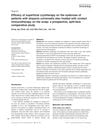 9 citations,
August 2018 in “JAAD Case Reports”
9 citations,
August 2018 in “JAAD Case Reports” Tofacitinib can temporarily improve hair growth in alopecia universalis, but its effectiveness may decrease over time.
 January 2023 in “Indian Dermatology Online Journal”
January 2023 in “Indian Dermatology Online Journal” No single ideal JAK inhibitor for alopecia areata has been determined; JAK3 inhibitors may be promising with fewer side effects.
 8 citations,
June 2022 in “Frontiers in Medicine”
8 citations,
June 2022 in “Frontiers in Medicine” Both individual and combined treatments of tofacitinib and corticosteroids can help regrow hair in moderate-to-severe alopecia areata, but ongoing treatment may be necessary.
 16 citations,
October 2016 in “The Journal of Dermatology”
16 citations,
October 2016 in “The Journal of Dermatology” Superficial cryotherapy is effective and safe for treating alopecia areata, with better results when used early and frequently.
 11 citations,
January 2020 in “Dermatologica Sinica”
11 citations,
January 2020 in “Dermatologica Sinica” Tofacitinib helps regrow hair in severe alopecia patients, but more research is needed.
 March 2024 in “Clinical, cosmetic and investigational dermatology”
March 2024 in “Clinical, cosmetic and investigational dermatology” Upadacitinib may effectively treat alopecia areata without side effects.
 1 citations,
April 2018 in “Journal of Investigative Dermatology”
1 citations,
April 2018 in “Journal of Investigative Dermatology” Tofacitinib helped most patients with alopecia areata regrow hair and changes in immune cells were linked to the treatment's effectiveness.
25 citations,
December 2017 in “The journal of investigative dermatology. Symposium proceedings/The Journal of investigative dermatology symposium proceedings” Targeted cytokine treatments may help with alopecia areata, but more research is needed.
 185 citations,
June 2014 in “Journal of Investigative Dermatology”
185 citations,
June 2014 in “Journal of Investigative Dermatology” A man with severe hair loss and skin disease regrew his hair with no side effects after taking tofacitinib.
 August 2024 in “Bioscience of Microbiota Food and Health”
August 2024 in “Bioscience of Microbiota Food and Health” Microbes might play a role in vitiligo.

Tofacitinib may effectively treat hair loss and improve symptoms in autoimmune conditions like alopecia areata and Sjögren's syndrome, but long-term treatment might be necessary.
 44 citations,
June 2018 in “Journal of Cellular Physiology”
44 citations,
June 2018 in “Journal of Cellular Physiology” Researchers developed a 3D model of human hair follicle cells that can help understand hair growth and test new hair loss treatments.
 June 2020 in “Journal of Dermatological Treatment”
June 2020 in “Journal of Dermatological Treatment” Use telemedicine and strict hygiene for safe hair and scalp treatments during COVID-19.
May 2022 in “Journal of the Dermatology Nurses' Association” The convention highlighted the importance of comprehensive patient care and early diagnosis in dermatology.
 66 citations,
June 2021 in “Journal of The American Academy of Dermatology”
66 citations,
June 2021 in “Journal of The American Academy of Dermatology” Baricitinib is effective and safe for treating severe alopecia areata.
4 citations,
June 2023 in “Frontiers in immunology” JAK inhibitors help hair regrowth in alopecia areata but have a high risk of side effects.
 70 citations,
October 2020 in “The journal of allergy and clinical immunology/Journal of allergy and clinical immunology/The journal of allergy and clinical immunology”
70 citations,
October 2020 in “The journal of allergy and clinical immunology/Journal of allergy and clinical immunology/The journal of allergy and clinical immunology” Janus kinase inhibitors are promising drugs for treating autoimmune and inflammatory diseases.
138 citations,
March 2021 in “Journal of the American Academy of Dermatology” Ritlecitinib and brepocitinib effectively regrow hair in alopecia areata patients.
15 citations,
January 2023 in “Antioxidants” Oxidative stress plays a significant role in alopecia areata, and new treatments may include JAK inhibitors and antioxidants.
 6 citations,
November 2014 in “The journal of investigative dermatology/Journal of investigative dermatology”
6 citations,
November 2014 in “The journal of investigative dermatology/Journal of investigative dermatology” Stephen Rothman made important discoveries in dermatology, including the use of PABA in sunscreens, but never profited from his work.
 April 2024 in “Journal of asthma and allergy”
April 2024 in “Journal of asthma and allergy” Abrocitinib effectively treated severe atopic dermatitis and mild alopecia areata in a 12-year-old boy after dupilumab failed.
 51 citations,
June 2016 in “Journal of the European Academy of Dermatology and Venereology”
51 citations,
June 2016 in “Journal of the European Academy of Dermatology and Venereology” Tofacitinib was effective in treating hair loss in two patients with alopecia universalis.
 June 2023 in “Dermatology and therapy”
June 2023 in “Dermatology and therapy” The Middle East and Africa need better data, treatment consensus, and support for Alopecia Areata.
 32 citations,
December 2018 in “Cytokine”
32 citations,
December 2018 in “Cytokine” Type I interferons play a key role in the development of various skin diseases.
 7 citations,
January 2017 in “International Journal of Dermatology”
7 citations,
January 2017 in “International Journal of Dermatology” Superficial cryotherapy significantly improves eyebrow hair growth in alopecia universalis patients.
 1 citations,
January 2017 in “Springer eBooks”
1 citations,
January 2017 in “Springer eBooks” Understanding the immune-related causes of Alopecia Areata has led to potential treatments like JAK inhibitors.
 18 citations,
January 2017 in “Journal der Deutschen Dermatologischen Gesellschaft”
18 citations,
January 2017 in “Journal der Deutschen Dermatologischen Gesellschaft” High and low doses of prednisolone helped 62% of children with severe alopecia regrow hair with some weight gain and mild acne as side effects.
 February 2024 in “International neuropsychiatric disease journal”
February 2024 in “International neuropsychiatric disease journal” Alopecia areata severely impacts quality of life, mental health, and work productivity.
 January 2025 in “Frontiers in Medicine”
January 2025 in “Frontiers in Medicine” Hair follicles are key to treating vitiligo and alopecia areata, but challenges exist.
 January 2025 in “International Journal of Molecular Sciences”
January 2025 in “International Journal of Molecular Sciences” Psoriasis involves immune and genetic factors, and understanding these can improve treatments.
























